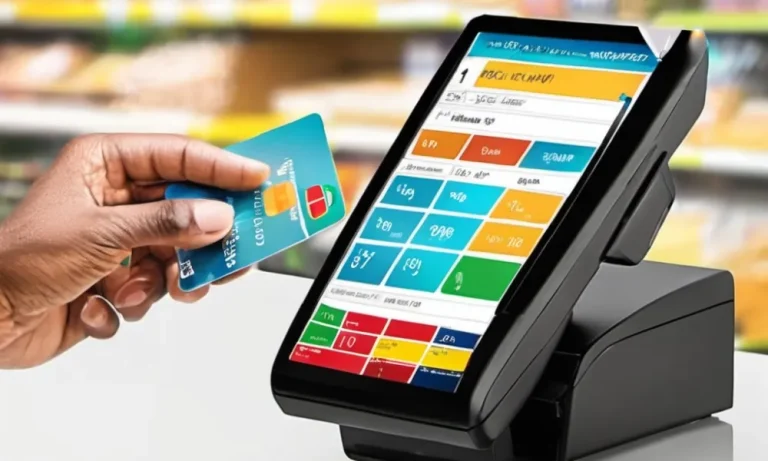Running a small retail business can feel like juggling a million things at once—keeping customers happy, managing inventory, and making sure everything runs smoothly. It’s no easy task, and sometimes, it feels like there’s just not enough time in the day. But what if I told you there’s a simple tool that could make all of this a lot easier? Enter the POS system.
You might be thinking, “Isn’t that just a fancy cash register?” Well, yes and so much more. A point-of-sale (POS) system is a game-changer for small retailers. If you’re running a cosy local boutique or a small family-owned shop, a POS system can be your secret weapon for growth.
1. Efficient Transaction Processing
At the heart of any Pos system is the ability to process transactions quickly and accurately. As a small retailer, you’re likely dealing with a steady flow of customers, especially during busy shopping periods. An efficient POS system ensures that each sale is processed without unnecessary delays, reducing wait times and keeping customers satisfied.
Traditional cash registers can be prone to errors, requiring manual input for each item, which can slow down the process and create frustration for both the customer and the staff. A modern POS system, however, automatically calculates prices, taxes, and discounts, speeding up transactions and improving accuracy.
If you’re using a traditional terminal or a mobile POS, your staff can handle multiple transactions in less time, allowing them to focus on providing excellent customer service.
2. Real-Time Inventory Management
Inventory management is one of the trickiest aspects of running a retail business. If you run out of stock on a best-selling item, you risk losing customers to competitors. On the other hand, overstocking leads to excess inventory costs and clutter.
An online POS system simplifies inventory tracking by providing real-time updates on stock levels. When a sale is made, your inventory count is automatically updated, helping you avoid stockouts or overstocking issues.
This level of visibility means you can keep track of your most popular products, identify slow-moving items, and make data-driven decisions about restocking. Many POS systems even allow you to set up automatic reordering alerts, so you never run out of stock on high-demand items.
3. Data-Driven Insights for Smarter Decisions
Small retailers often struggle with business decisions due to limited access to actionable data. But a POS system provides a wealth of information that can help you make smarter, more informed decisions about your business.
From tracking sales patterns and customer preferences to analyzing employee performance, a POS system can give you a 360-degree view of your operations. For example, you can see which products are selling the most, when the peak shopping hours are, and which promotions are performing well. This data helps you identify trends, optimise your pricing strategy, and make inventory decisions based on actual sales data rather than guesswork.
Some POS systems even provide detailed reports on employee performance, enabling you to track which team members are the most efficient or identify areas where additional training might be needed. This kind of insight is invaluable for small businesses trying to improve profitability and streamline operations.

4. Enhanced Customer Experience
Customer experience is everything. A modern POS system can help small retailers provide a seamless and personalized shopping experience that keeps customers coming back.
For example, many POS systems allow you to create customer profiles that track purchase history, preferences, and contact details. This data lets you offer tailored promotions, loyalty rewards, and even personalised discounts. When customers feel like you know them and understand their preferences, they’re more likely to return and recommend your store to others.
Additionally, POS systems are designed to speed up the checkout process, reducing long lines and wait times. A fast and smooth transaction, especially during peak hours, can make all the difference in a customer’s perception of your business.
5. Cost Savings
Small businesses often work with limited budgets, so it’s essential to find ways to save on operational costs. While some small retailers might hesitate to invest in a POS system due to upfront costs, the truth is that POS systems can lead to significant savings in the long run.
For starters, modern POS systems are much more accurate than manual methods of tracking sales and inventory. With fewer errors, you reduce the risk of losing money due to undercharging, overcharging, or inventory mistakes. Additionally, by automating tasks like inventory tracking and employee timekeeping, you save time and reduce the risk of human error. This efficiency can lead to higher productivity and less time spent on administrative tasks.
6. Scalability as Your Business Grows
One of the best things about investing in a POS system is that it’s scalable. As your business grows, your POS system can grow with you. Whether you’re adding more locations, expanding your product range, or launching an online store, a POS system can easily accommodate these changes.
With a cloud-based POS system, all your data is stored securely online, making it easy to access from multiple locations or devices. If you decide to open a second store, for example, you can manage both locations from a single system, without the need for complicated installations or technical expertise.
Many POS providers offer various subscription plans, so you can start with a basic plan and upgrade as your business needs evolve.
7. Better Security for Your Business
Security is a growing concern for small businesses, especially when it comes to handling customer payment information. Modern POS systems are equipped with advanced security features that protect both your business and your customers.
With encryption and tokenization technologies, your POS system can securely process credit card transactions and protect sensitive customer data. Many POS systems are also compliant with the latest Payment Card Industry Data Security Standard (PCI DSS) regulations, ensuring that you meet the necessary security requirements. In an age of increasing cyber threats, a secure POS system gives you peace of mind knowing that your business is protected.
Conclusion
For small retailers, a POS system is much more than just a way to process sales. It’s a powerful tool that can help you manage inventory, enhance customer experience, track business performance, and even save on costs. With all these benefits, it’s no wonder that POS systems have become a secret weapon for small businesses looking to stay competitive and grow.
If you’re not already using a POS system, it’s time to consider making the switch. Investing in a reliable, easy-to-use POS system can transform your business operations and help you provide a better experience for both your customers and your team.


Comments are closed.